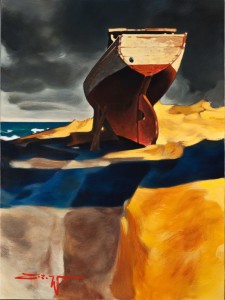How Not to Live with a Psychotic Wife
sometimes I’m lost in substructure and I’m feeling nothing but nothing feels fine
sometimes everything hovers above me and I can’t grab can’t grab but still try try
sometimes I’m filthy dirty and can’t wash it off ff – othertimes clean as a flute
I wonder about how this escapade is life
or when a thisle tears my flesh or blows its tendrils
to some wind I’m not privy to…
sometimes magnetic sometimes anodized
sorry, I’ve forgotten your name
who are you to beseech me? We’ve not been introduced
I fucked you out of boredom with everyday life –
that’s how I became your friend
nonsense is everybody’s relevance
I was maybe – everyone likes a ride
I’d seen her suffering in my middle
downcast yet fabulous – meager
I’d be her agent not her army, I’d pave wayward
her crooked smile
with everything concrete I owned
as may, dismal partners – it was I who left –
her ruins never casting shadow
___________________
William Fairbrother
Review by Pamela O’Shaughnessy
This poem addresses the titular wife. At first the speaker is trying to explain his existential position: “sometimes I’m lost in substructure”…”sometimes I’m filthy dirty and can’t wash it off.” The first stanza exhibits William’s drive-by lyricism with a brief simile – “sometimes [I’m] clean as a flute“. There is absurdity of style and an initial anger verging on cruelty: the two people talking have not been introduced, yet “I fucked you out of boredom…” Then the speaker’s mood changes. The speaker is still harsh in his appraisal of the relationship, but growing more tentative “I was maybe – everybody likes a ride”. Later, he has left the conversation and is reflecting, nostalgic, even appreciative of the relationship, regretful: “I’d pave wayward/her crooked smile /with everything concrete I owned”. The poem ends with resignation. Her “ruins” no longer trouble the speaker. It is finished. You might even call the poem an elegy. But tracing the meanings through the poem doesn’t do justice to William’s greatest strength, which is his style of conversational flow spiked with intense self-revelation. We are jolted and enlightened.

